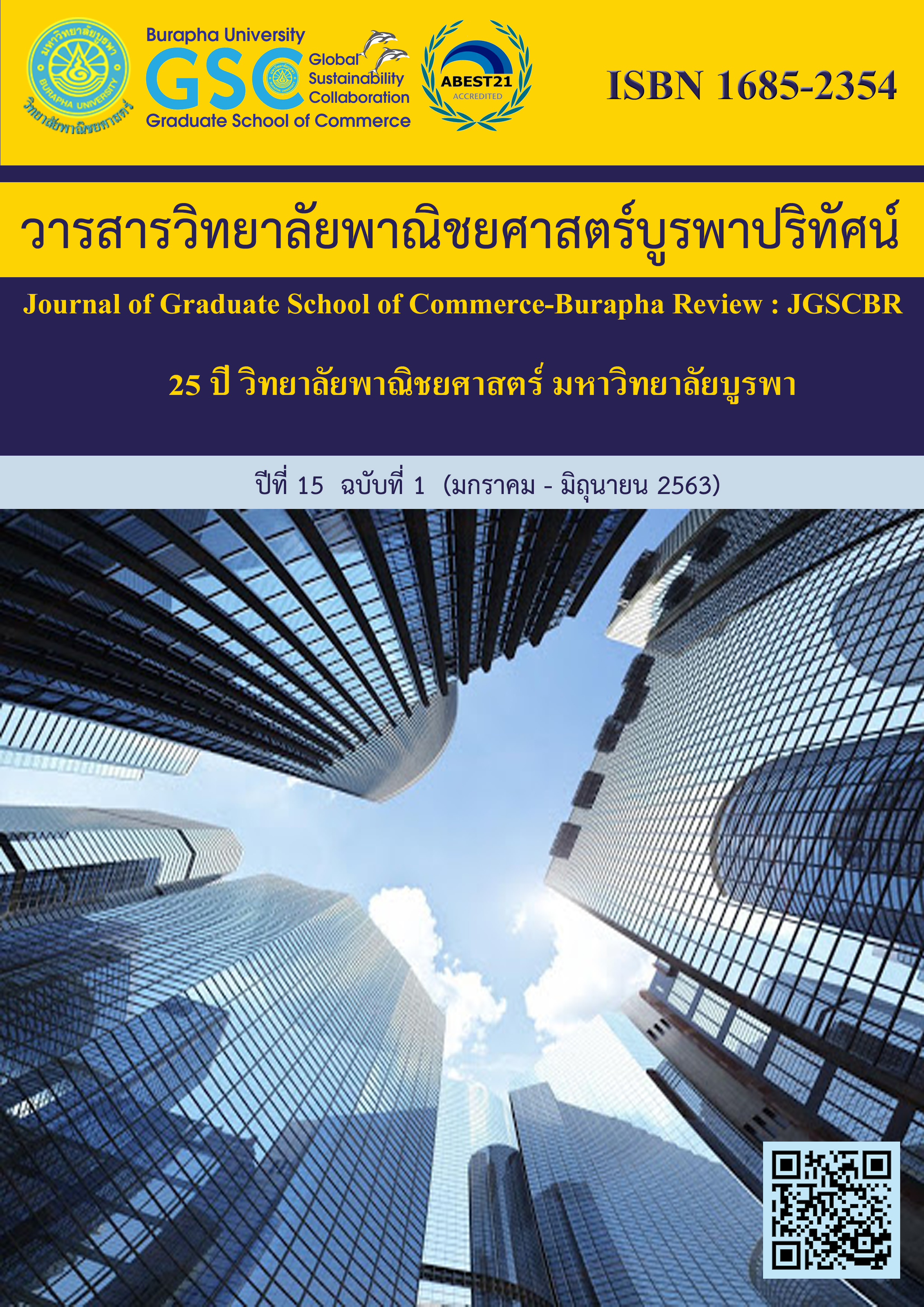THE EFFECT OF WORK ENVIRONMENT AND ACHIEVEMENT MOTIVATION ON PERFORMANCE OF THE EMPLOYEES: A CASE STUDY OF A CONSUMER PRODUCT COMPANY IN THE SAHA GROUP INDUSTRIAL PARK, CHON BURI
Main Article Content
Abstract
The purpose of this research study were 1) to analyze the effect of work environment on achievement motivation 2) to analyze the effect of work environment on employee performance and 3) to analyze the effect on achievement motivation on performance. The sample size of this study was 348 employees of a consumer product company in the Saha Group Industrial Chonburi Province. The simple random sampling method was used for collecting data and the statistical program of social science was used for analyzing data.
The test results showed that 1) The employees perceived the suitability of the work environment, achievement motivation and performance of the employees at a high level 2) The Work Environment has a significant positive impact on the performance of employees at the level of 0.05, including work environment for task orientation and autonomy. 3) Work Environment that has a significant positive influence on achievement motivation at the level of 0.05, including work environment for task orientation, autonomy, innovation and physical comfort, and 4) Achievement motivations that have a significant positive impact on the performance of employees at the level of 0.05, including achievement motivation for moderate risk taking, individual responsibility and unique characteristic.
Article Details
The owner of the article does not copy or violate any of its copyright. If any copyright infringement occurs or prosecution, in any case, the Editorial Board is not involved in all the rights to the owner of the article to be performed.
References
กัลยา วานิชย์บัญชา. (2546). การใช้ SPSS for Windows ในการวิเคราะห์ข้อมูล (พิมพ์ครั้งที่ 6). กรุงเทพมหานคร: โรงพิมพ์จุฬาลงกรณ์มหาวิทยาลัย.
ประกายมาศ เพชรรอด. (2557). ปัจจัยที่มีผลต่อแรงจูงใจในการปฏิบัติงานของพนักงาน บริษัท แอล .วาย.อินดัสตรีส จำกัด. งานนิพนธ์ปริญญามหาบัณฑิต, มหาวิทยาลัยเกษมบัณฑิต.
ปราณี หลําเบ็ญสะ. (2559). การหาคุณภาพของเครื่องมือวัดและประเมินผล. สาขาการวัดและประเมินผล. คณะครุศาสตร์ มหาวิทยาลัยราชภัฏยะลา.
พิรจิต บุญบันดาล. (2551). คุณลักษณะผู้นำยุคใหม่แรงจูงใจใฝ่สัมฤทธิ์กับประสิทธิผลองค์การ. วิทยานิพนธ์วิทยาศาสตรมหาบัณฑิต. สาขาจิตวิทยาอุตสาหกรรมและองค์การ. มหาวิทยาลัยรามคำแหง.
พูนศิริ วัจนะภูมิ และจิตตินันท์ เดชะคุปต์. (2545). จิตวิทยาการบริการ. (หน่วยที่ 1-7). กรุงเทพฯ: มหาวิทยาลัยสุโขทัยธรรมาธิราช. 159.
เสนาะ ติเยาว์. (2520). การบริหารงานบุคคล. กรุงเทพฯ: คณะพาณิชยศาสตร์และการบัญชี. มหาวิทยาลัยธรรมศาสตร์.
อธิป ศรีเปารยะ. (2554). ความสัมพันธ์ระหว่างบรรยากาศองค์กรและแรงจูงใจในการปฏิบัติงานของพนักงานโรงแรม เวสทิน แกรนด์สุขุมวิท. วิทยานิพนธ์ศิลปศาสตรมหาบัณฑิต. วิทยาลัยดุสิตธานี.
อุดม พินธุรักษ์. (2553). ความสัมพันธ์ระหว่างภาวะผู้นำการเปลี่ยนแปลงของผู้บริหารสถานศึกษากับประสิทธิผลการบริหารงานบุคคลโรงเรียนประถมศึกษา สังกัดสานักงานเขตพื้นที่การศึกษาอุดรธานี. วิทยานิพนธ์ครุศาสตรมหาบัณฑิต. สาขาวิชาการบริหารการศึกษา. มหาวิทยาลัยราชภัฎอุดรธานี. 5.
Gilmer, B.V.H. (1975). Applied Psychology: Adjustment in Living and Work. 2nd ed. New York: McGraw-Hill Book. 392-393.
Judge, T. A., C. J. Thoresen, J. E Bono and G. V. Patton. (2001). The job satisfaction-Job performance relationship: a qualitative and quantitative review. Psychological Bulletin 127(3): 385-386.
McClelland, D. C. (1953). The Achievement Motive. New York: Appleton Centurycrofts.
McClelland, D. C. (1961). The Achieving Society. Princeton: D. Van Nonstrand Company, Inc.
McClelland D. C., R. Koestner and J. Weinberger. (1989). How do self-attributed and implicit motives differ. Psychological Review 96(4): 690-702.
Moos, R.H. (1994). Work environment Scale Manual. 3rd ed. Palo Alto, CA: Consulting psychologists press.
Peterson, E., and G.E. Plowman. (1953). Business Organizational and Management. Illinois: Irwin.
Pitaloka, E., and I.P. Sofia. (2014). The effect of work environment, job satisfaction, organization commitment on OCB of internal auditors. International Journal of Business, Economics and Law 5(2): 15.


